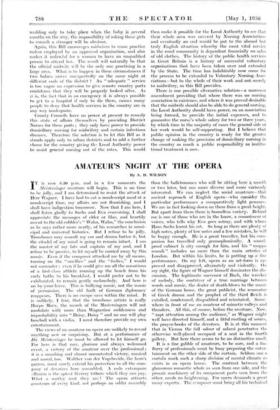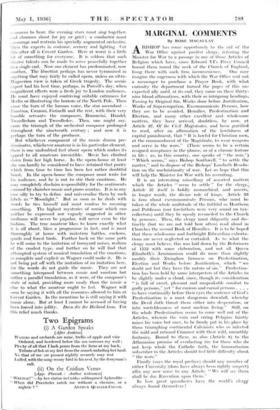AMATEUR'S NIGHT AT THE OPER
By A. D. WILSON
Eyell if the composer attacked me by all means, . turning on the "smcllies" and the "fcclies," I would not surrender ; even if he could give me all the sensations of a first-class athlete running up the beach from his early bathe to his breakfast, I would prefer not to be exhilarated, to remain gently melancholy. And here is no by-yOUr-leave. This is bullying music, not the music. of persuasion. The old fault of GerMan diplomacy reappears. There is no escape save Within the mind. It is unlikely, I fear, that the trombone artiste is really Ilarpo Marx, the march of the Mastersingers. not modulate with more than 1Vagnerian suddenness and improbability into " Daisy, Daisy " and no one will play baseball with a violin. I must therefore proVide my own entertainment.
The views of an amateur on opera arc unlikely to reveal anything new or surprising. But at a performance of Die Meistersinger he must be allowed to let himself go. For here is. that rare, glorious and always welcomed event, a victory of the amateur over the Professional ; it is a smashing and almost uncontested victory, musical and moral, too. Walther von der Vogeiweide, the hero's patron, must surely extend his protection to all the com- pany of devoteeS here assembled. A rude extempore effusion is the aptest literary tribute which they can pay, %That a motley rout they are! The opera attracts Jun:dears of every kind, not perhaps an odder assembly than the balletomanes who will be sitting here a month or two later, but one more diverse and. more variously interested. We can neglect . the social amateurs,---that ancient reproach of English opera—who consider the particular performance a comparatively light penance. We are in fact looking down on them from a great height. But apart from them there is. boundless variety. . Behind me is one of those Who are in the kaow, a connoisseur of voices, who tells why Eva goes astray, and with whom Hans Sachs learnt his art. So long as there are plenty of high notes, plenty of low notes and a few mistakes, he will be happy enough. He is a great traveller, but his com- panion has travelled only gramophonically. A sou nd- proof cabinet Is city enough for him, and his " mappa mundi ". includes no more than the main arteries of London. But within his limits, he is putting up. a' fine performance. On my left, opera .as an art-form is. ap- proved and disapproved, alternately and violently. On my right, the figure of Wagner himself dominates the dis- cussion.. The , legitimate successor of ,Bach,.the wrecker of melody, _the contriver of a true marriage between m words and music, the dealer of death-blows to the music of the German home, the great publicist, the renovator of Greek drama and the prophet of the third Reich is extolled, co. ndemned, disqualified and reinstated. Some- where in front of me an amateur of mimetic volleys and thunders. All this, of course, before the, overture. Now, " rapt attention among the audience," as Wagner might well have directed himself, and a fitful rustling -of scores, the prayer-books of the devotees. It is at this moment that in Vienna the full odour of salami penetrates the otherwise well-placed occupant of a seat in- the fourth gallery. But here there seenis to be no distinctive smell.
It is a fine gabble of amateurs, to be sure, and a fine flurry of professionals must be busy preparing the enter- tainment on the other side of the curtain. Seldom can a curtain mark such a sharp division of mental climate as exists in an opera house. The contrast between the glamorous romantic whole as seen from one side, and the prosaic machinery of its component parts-seen from the other, needs no heightening. For-opera 'demands a great many experts: The ecmposer must bring all his technical 31-sources to bear, the evening stars must sing together, and choruses shout for joy or grief ; a conductor must encourage and restrain his specially augmented orchestral. Then the experts in costume, scenery and lighting—hut this after all is Covent Garden. Here at worst is a little bit of something for everyone. It is seldom that such diverse talents can be made to serve peacefully together to a single end. Now one element has predominated, now another. The librettist perhaps has never tyrannised in anything that may fairly be called opera, unless an ultra- Wagnerian view is taken of Greek tragedy. The scenic expert had his best time, perhaps, in Purcell's day, when magnificent effects were a fresh joy to London audiences. He must have enjoyed contriving suitable entrances for Merlin or illustrating the horrors of the North Pole. Then came the turn of the human voice, the star ascendant- Faustina, Cuzzoni, Farinelli and the rest, with their very humble servants the composers, Bononcini, Handel, Tweedledum and Tweedledee. Then, one might say, came the triumph of the orchestral composer prolonged throughout the nineteenth century ; and now it is perhaps the turn of the producer.
But whichever component of the music drama pre- dominates, whichever amateur is in his particular element, there is one undoubted fact about opera which makes its appeal to all amateurs irresistible. Music has climbed down from her high horse. In the opera-house at least she can hardly be considered to have retained that purity which from time to time has been her rather doubtful boast. In the opera-house the composer must. write for his audience, and he is out to stir their emotions. He may completely disclainiresponsibility for the sentiments tiro-a-sec/by chat iber music and piano sonatas. It is in any case Silly to try to define and universalise them by such labels as"" Moonlight." But as soon as he deals with words he ties hiniSelf and must confess to meaning something. The highest mysteries of music which can neither Awe expressed nor vaguely suggested in other mediums will never be popular, will never even be the fashion. The true amateur likes to know exactly what it is all about, likes a programme in fact, and is most thoroughly. -at home with imitation battles, cuckoos, quails andl. forest birds. Further back on the same path he will come to the imitation of farmyard noises, realisni of the crudest type, and further on he will find that attempted system of musical translation of the emotions, as CoMptete and explicit as Wagner could make it. He is not being put off with the imitation of an imitation here, for the words do not guide the music. They are not something interposed between music and emotion but rather a parallel translation, as it were, of the composer's state of mind, providing more easily than the music a clue to what the amateur ought to feel. Wagner will soon be saying it with all the resources allowed to him at Covent Garden. In the meantime he is still saying it with music alone. But at least I cannot be accused of having been forced into jollity. Dazu dir der Heiland kam. For this relief much thanks.















































 Previous page
Previous page